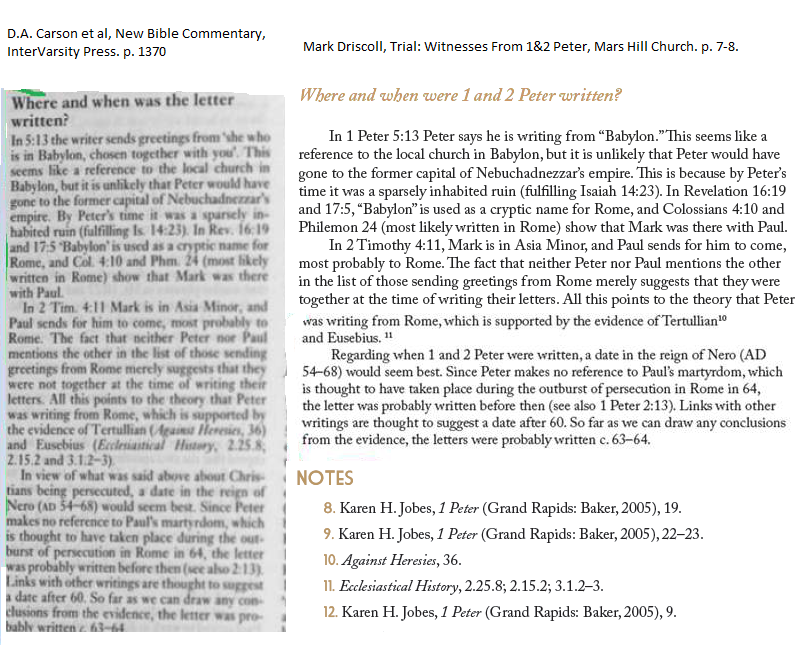This is pretty silly.
[youtube]http://www.youtube.com/watch?v=DdPz7Eg18jU[/youtube]
Joan Landes is a “clinical mental health therapist” from Utah. She has a master’s degree in counseling, and as far as I can determine, no particular training in neuroscience.
In this video, you will learn that common core causes kids to use emotional words that will harm their brains, that the Columbine and Sandy Hook shootings were related to modern changes in children’s literature, that reading information is not necessary because children can use Google and get facts when they are teens, that Common Core emphasis on emotional words could create an “Arab Spring” (“just takes one trigger and you have a national mob”), and that Common Core will create a generation which is easily manipulated by those in power.
Landes correctly describes Piaget’s stages at one point but does not explain how a child who reasons concretely will be harmed by the Common Core language curriculum. She tries to describe the Asch conformity experiments but gets the results wrong. She then claims Common Core is trashing established psychological research but doesn’t say how. Some of what she laments about schools were true before Common Core came along (e.g., teachers have a great influence over children).
At one point, perhaps realizing how outrageous the claims were getting, the video host suggests that perhaps all of the ills outlined by Landes are not found in the language arts curriculum. Then another woman says that is perhaps true but since the Dept of Education secretary Duncan talks about social justice, the concerns are still warranted.
Don’t get me wrong, I don’t like a lot of the emphasis on teaching to the test one often sees in schools. However, as I understand Common Core standards, teachers have some flexibility in how they are implemented (I know that is true in my own child’s school). I also think there are some legitimate criticisms of Common Core standards but this video really misuses psychological language and research to generate fear and outrage.
I am not surprised that Landes is appearing with David Barton at anti-Common Core rally in Alabama in January.
Mars Hill’s Sermon Series Document Reveals Background of Mark Driscoll’s Book on Peter, Part Two
On Tuesday, I discussed a document found on The Resurgence website which contained the research notes behind Mark Driscoll’s book on the apostle Peter. That document was missing for awhile but now has been returned to the website (seems to be gone from the website again, here it is). In that post, I examined paragraphs from the NBC, Driscoll’s book and Justin Holcomb’s research notes. In this post, I want to review three additional paragraphs in a similar manner. From both of these efforts, it appears to me that Holcomb’s work was adequately documented. One problem I found was that one of the endnotes cited the wrong source which is an easy mistake to make. However, it seems clear to me from the use of quotes and citations that Holcomb was not presenting the information as his own work.
Furthermore, it appears to me that Rev. Driscoll (or someone on his behalf) took Dr. Holcomb’s research notes and included them nearly verbatim into Trial: 8 Witnesses From 1 & 2 Peter. As a result, the material originally from the New Bible Commentary — as stated by Intervarsity Press — “improperly appeared without quotation or attribution” in Driscoll’s finished product. As I see it, the material may have ended up in the Driscoll book via mistake by Driscoll or his staff. However, if I am accurate in my analysis, another question arises: Was is proper for Driscoll to take material from a research assistant, remove the quotations and citations provided by that research assistant and then portray that work and research as his own work? While I may be wrong in my analysis, until Driscoll explains how the material from Holcomb’s research appeared in his book, one is left to speculate based on the available evidence.
First, examine paragraphs from Holcomb’s notes on page 149:
Where and when was the letter written?
“In 5:13 the writer sends greetings from ‘she who is in Babylon, chosen together with you‘. This seems like a reference to the local church in Babylon, but it is unlikely that Peter would have gone to the former capital of Nebuchadnezzar‘s empire. By Peter‘s time it was a sparsely inhabited ruin (fulfilling Is. 14:23). In Rev. 16:19 and 17:5 ‘Babylon‘ is used as a cryptic name for Rome, and Col. 4:10 and Phm. 24 (most likely written in Rome) show that Mark was there with Paul. In 2 Tim. 4:11, Mark is in Asia Minor, and Paul sends for him to come, most probably to Rome. The fact that neither Peter nor Paul mentions the other in the list of those sending greetings from Rome merely suggests that they were not together at the time of writing their letters. All this points to the theory that Peter was writing from Rome, which is supported by the evidence of Tertullian (Against Heresies, 36) and Eusebius (Ecclesiastical History, 2.25.8; 2.15.2 and 3.1.2–3).
In view of what was said above about Christians being persecuted, a date in the reign of Nero (AD 54–68) would seem best. Since Peter makes no reference to Paul‘s martyrdom, which is thought to have taken place during the out-burst of persecution in Rome in 64, the letter was probably written before then (see also 2:13). Links with other writings are thought to suggest a date after 60. So far as we can draw any conclusions from the evidence, the letter was probably written c. 63–64.
Note the quotes at the beginning of this section. Immediately below is a screen capture of the beginning (p. 149) and end of the section in question (p. 150) from Holcomb’s research notes. The quotes are enclosed in red.
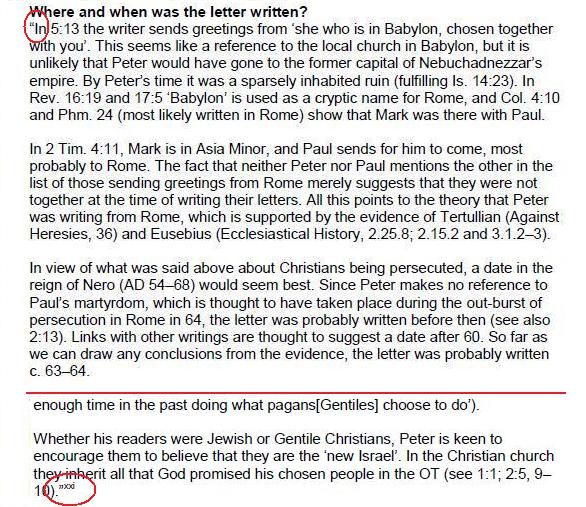 At the end of the passage, along with the closing of the quote, the superscript “xxi” is provided and leads to this correct reference information:
At the end of the passage, along with the closing of the quote, the superscript “xxi” is provided and leads to this correct reference information:
David Wheaton, ―1 Peter in New Bible Commentary: 21st Century Edition, Ed. D. A. Carson, 4th ed. (Downers Grove, Ill.: Inter-Varsity Press, 1994).
In the book Trial: 8 Witnesses From 1 & 2 Peter, Driscoll did not use all of what Holcomb provided but did incorporate some of it nearly verbatim. Also, note that the research notes do not paraphrase the Bible commentary but include the passage verbatim within the quotations. At this link you can see the entire section uncut, thus demonstrating that the section was set off by quotes with correct citation to the chapter on Peter in the NBC.
Now compare the passage above with the original chapter in the NBC and as included in the book by Driscoll.
In this section, Driscoll (or someone) removed the quotes from the research notes, changed a few words and included the material in his book without the citation. He did, however, include the references to Against Heresies and Ecclesiastical History as footnotes. The appearance is that Rev. Driscoll consulted those sources directly.
I am not going to speculate much more about what happened. I simply don’t know what was behind the decision to include this material as it is. However, I don’t believe Holcomb as research assistant should be the focus of this matter as was implied in the statement made by Mars Hill Church on their website. The ball is in Driscoll’s court to address the questions about proper use of a research assistants’ work when there is no credit given.
For me, the issue of ghostwriting and use of research assistance is a prime topic we should be talking about. I am with John Piper on this. Putting one’s name on material one did not write is misleading and corrosive to trust among consumers of published materials. It seems to me that the Christian publishing industry, authors, ministers and other stakeholders should engage in reflection about this practice. One good thing that I hope emerges from this controversy is a new standard that discourages ghostwriting and provides guidelines for the proper and honest attribution of authorship.
Another issue of concern relates to the statement from Mars Hill Church about “citation errors” in the book on 1 & 2 Peter. Their altered statement (you can read the original and altered statements here) suggests that the problems with the book on Peter were due to a “team of people, including a research assistant.” However, now it appears from this information on their own website that the issue was not the Docent researcher but whoever took the researcher’s work and put Mark Driscoll’s name on it.
Janet Mefferd Breaks Silence in Slate Article on Driscoll Controversy
Janet Mefferd has drifted into the background since her apology for her on-air actions with Mark Driscoll on her November 21 broadcast. Today, in an article on Slate by Ruth Graham, Mefferd breaks her silence on the Driscoll controversy.
Mefferd is clear that she continues to believe Driscoll’s books inappropriately used material from other sources and that he needs to make it right. Go on over to Slate and read the article.
John Piper Calls Out Famous Guys (Like Mark Driscoll) On Ghostwriting
It is getting serious up in here.
Last night on Twitter, John Piper posted a series of tweets apparently in response to an op-ed by Andy Crouch at Christianity Today on the Mark Driscoll plagiarism (now ghostwriting) controversy. Crouch’s op-ed builds to this crescendo:
The real danger here is not plagiarism—it is idolatry.
I think both are a problem and as it turns out another related problem appears to be ghostwriting.
Piper doesn’t think highly of taking credit for the work of others. To wit:
Yes. Andy Crouch on the idolatry of ghost writing. http://t.co/vzb8xc98yX
— John Piper (@JohnPiper) December 11, 2013
If lying is the "industry standard" reject it. Come on, famous guys, if someone writes for you, put the plebe's name on it.
— John Piper (@JohnPiper) December 11, 2013
This applies to you too, presidents, ministry leaders, fund raisers. If someone writes a letter for you, put the name on it.
— John Piper (@JohnPiper) December 11, 2013
Just in case you want to hear my emotion about this ghost writing thing, here's groaning last July. http://t.co/nzmh57jTCW
— John Piper (@JohnPiper) December 11, 2013
As Crouch and Piper suggest, this controversy is turning toward ghostwriting and less than honest assignment of credit for scholarly work. In the last tweet posted above, Piper links to an audio where he addresses ghostwriting. In it he says, “I think to put your name on a book you didn’t write is a lie.” Piper leaves no doubt as to his dim view of misrepresenting one’s work to the public.
Mars Hill's Sermon Series Battle Plan Reveals Background of Mark Driscoll's Book on Peter
After Mars Hill Church released a statement regarding Trial: 8 Witnesses From 1 & 2 Peter, questions were raised about the authorship of the guide. In the book, Driscoll is listed as author, along with former Mars Hill staffer Brad House. However, the statement issued by the church says that a “team of people, including a research assistant” were involved.
According to a document (surprise, it is now missing – for the document click here) on the Mars Hill website, The Resurgence, Docent Research Group consultant Justin Holcomb might better get the credit for the sections discussing the background of the books of 1 & 2 Peter. On page 143 (try here because Mars Hill removed the pdf) of the sermon series “battle plan,” this research note appears.
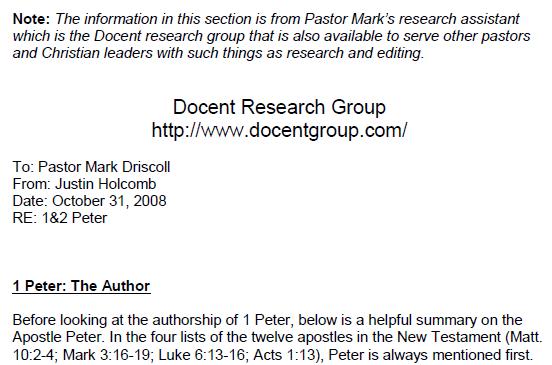
From pages 143-166, Holcomb presents what appears to be the basis for the text of the book that eventually became Trial: 8 Witnesses From 1 & 2 Peter. Thus, it appears that the original Mars Hill statement is mostly accurate but not revealing. Certain sections of the book are taken directly from this memo from Holcomb to Driscoll.
For instance, the sections which were identified by IVP as having been copied by Driscoll were themselves copied from the notes provided by Holcomb (see page 147 for example). The following information comes from page 147 of the memo from Holcomb to Driscoll:
First, Peter is described in Acts 4:13 as “unschooled”, and the style of Greek in which the letter is written is said to be too good for a Galilean fisherman to have used. Also, quotations are taken from the Septuagint (LXX), the Greek rather than the Hebrew version of the OT.
The style is, however, not so ‘educated‘ as some would like to make out and in places it is much more the language of ordinary people. There is evidence that in Peter‘s time Greek, as well as Aramaic, was spoken in Galilee, and as a fisherman living in Capernaum on one of the great trade routes he would have had to speak Greek regularly. The fact that his own brother‘s name, Andrew, is a Greek one suggests that from boyhood Peter would have grown up with this language. Some thirty years‘ work of evangelism and teaching in a church that contained an increasing proportion of Gentiles would have made him more fluent in Greek and prepared to quote the LXX as his Authorized Version‘.
Compare this to the text of Driscoll’s guide and the New Bible Commentary.
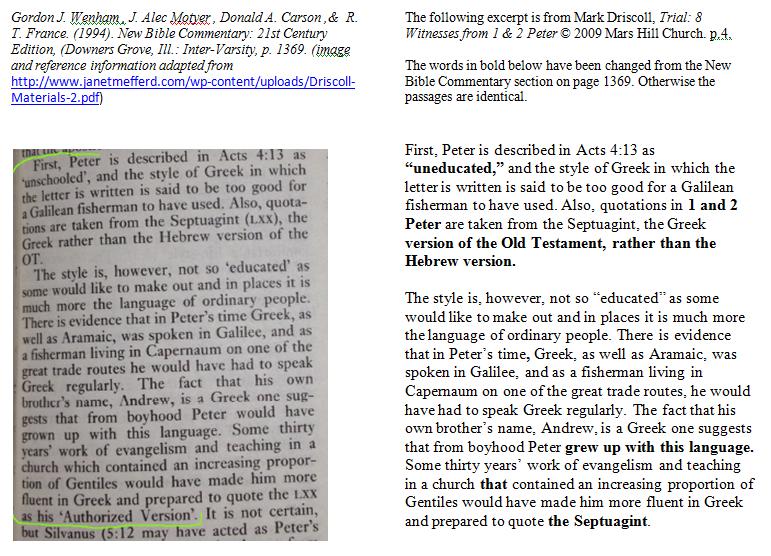
It appears the Holcomb borrowed quoted* the material from the New Bible Commentary and then Driscoll changed a few words and included it under his authorship. There are multiple instances of this practice throughout the memo. If one goes to the Docent Group’s website, the first video of endorsement one will see is of Mark Driscoll.
What started in late November with Janet Mefferd’s accusations of plagiarism against Mark Driscoll has morphed into broader concerns over authorship and use of research materials. This finding raises interesting questions about ghostwriting and the use of research in writing for publication. I am not aware of how wide spread this practice is but perhaps this story allows us a view behind a door not often opened.
UPDATE: This document and the Mars Hill statement about the plagiarism controversy make it appear that documentation is pretty lean in the research notes. However, a statement that Glenn Lucke, founder of the Docent Group, made to Andy Crouch at Christianity Today contradicts this impression. According to Crouch, Lucke told him that Docent’s “records show that Holcomb provided Mars Hill all the documentation needed to properly cite the IVP commentary.”
UPDATE (12/11/13) – After reading Lucke’s statement in the Christianity Today article, I went back to review again the material provided by Holcomb and Docent Group. I missed something the first time that I believe is significant. See the note below for an explanation.
*I changed this word from “borrowed” to “quoted” in the section above because there are quotes around the material starting just under the heading Who Wrote 1 Peter? also on page 147. Then the quote closes on page 148 with a footnote. However, the footnote is not to the New Bible Commentary but to a book by Peter Achtemeier. It is possible that the confusion is a matter of a mistake in this footnote which Driscoll just carried over to his book. In any case, with this new information, the focus seems to be more on Driscoll’s adopting this research report as his own work in the Trial book.
Note the quotes (in red circle) which begin this section:
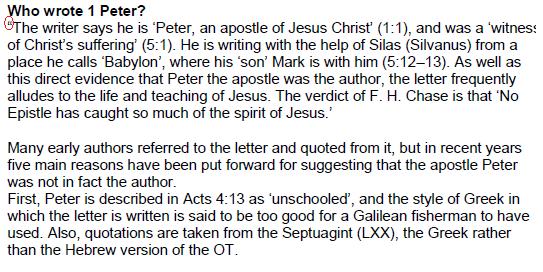
This section runs through the next page until quotes close the passage on page 148. It appears that the researcher including material in quotes with a footnote at the end of the passage. However, the citation was inaccurate, referring to Achtemeier’s book rather then the New Bible Commentary. Quite possibly this was a mistake. However, Driscoll (or someone on his behalf) then took that information, removed the quotes and placed the material in the book on Peter.
In a future post, I intend to compare the other selection from the NBC with the work of the researcher and Driscoll’s book.
Part two of this post is here.
See also:
On The Allegations Of Plagiarism Against Mark Driscoll (12/2/13)
Zombies, Plagiarism And Mark Driscoll Helped Me Write This Blog Post (12/3/13)
Mark Driscoll And His Church On Plagiarism (12/4/13)
Janet Mefferd Removes Evidence Relating To Charges Of Plagiarism Against Mark Driscoll; Apologizes To Audience (12/4/13)
Ingrid Schlueter Resigns From Janet Mefferd Show Over Mark Driscoll Plagiarism Controversy (12/5/13)
Who’s Talking About The Mark Driscoll Plagiarism Controversy? (12/7/13)
IVP Says Bible Commentary Improperly Appeared In Book by Mark Driscoll; Mars Hill Church Responds, Blames Researcher Mistakes for Errors (12/9/13)
Mars Hill Church Alters Statement on Mark Driscoll Plagiarism Controversy
